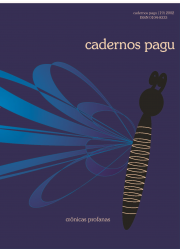Resumo
Este texto se volta para as vicissitudes do informante nativo como figura na representação literária. A autora trabalha “com uma oposição binária relativamente antiquada entre filosofia e literatura, segundo a qual a primeira concatena argumentos e a segunda concebe o impossível. Para ambas o informante nativo parece inevitável”. Ela examina a posição desse informante à luz do que chama de “axiomática do imperialismo” em Jane Eyre, de Brontë, Wide Sargasso Sea, de Rhys, e Frankenstein, de Shelley, para concluir com uma leitura de “Pterodactyl, Puran Sahay and Pirtha”, de Mahasweta Devi.
Abstract
This text picks at the vicissitudes of the native informant as figure in literary representation. Its author works “with rather an oldfashioned binary opposition between philosophy and literature; that the first concatenates arguments and the second figures the impossible. For both the native informant seems unavoidable”. She examines the position of such informant, in the light of what she calls the “axiomatics of imperialism” in Brontë’s Jane Eyre, in Rhys’ Wide Sargasso Sea, and in Shelley’s Frankenstein, to end up with a reading of Mahasweta Devi’s “Pterodactyl, Puran Sahay and Pirtha”.
Key Words: Gender. Deconstruction. Imperialism. Native Subject

